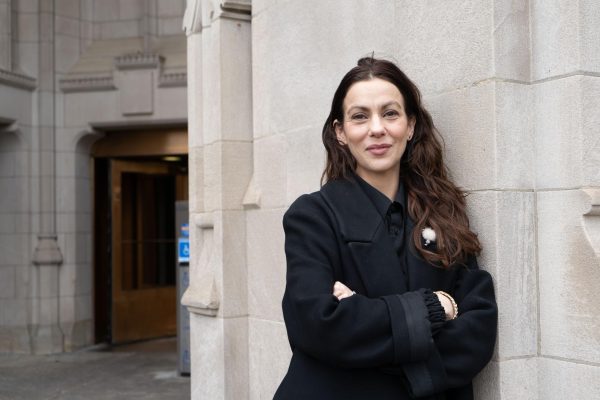Theater bares all in ‘Metamorphoses’
January 13, 2009
If you’re searching for a way to get your fill of classical Greek mythology without having to… If you’re searching for a way to get your fill of classical Greek mythology without having to read a textbook or sit through a classics lecture, Pittsburgh Public Theater’s newest production might be the answer to your problems. In Mary Zimmerman’s ‘Metamorphoses,’ mythical characters enact well-known stories for the audience around the production’s centerpiece, an on-stage pool of water. Adapted from Ovid’s famous poem of the same name, the play revolves around appropriate myths that focus on the idea, as implied by the title, of change. Ultimately, through depictions of themes like love, heartbreak, greed and the fragile human condition, the play reminds the audience of classical mythology’s timeless quality. Some of the more well-known myths performed include Midas and his cursed golden touch, the tragic story of Orpheus’ descent into Hades to find his beloved Eurydice and Phaeton’s ill-fated steering of Apollo’s chariot. The on-stage pool of water presents an interesting element to the play for the actors, the technical crew and the audience, said Monica Bowin, the director of production and operations. Throughout the show, characters use the pool to represent specific features of each myth. For example, a scene with Narcissus sees the pool as his mirror, while another has the pool act as the River Styx of the underworld. ‘I’ve never done a show like this before,’ said Bowin. ‘Water does provide a lot of challenges. It’s a live element, it’s dynamic ‘mdash; it certainly isn’t static. It can evaporate and cause humidity problems, [and] it has to be kept clean with chemicals ‘mdash; and there’s the issue of leaks, spills and tracking water on the set.’ She added, though, that the cast has been remarkably flexible and versatile in dealing with it and that she believes that will be evident for the audience. ‘The backstage production staff works with extraordinary pride and precision as well, and that’s a very cool thing,’ she said. Ka-Ling Cheung, an actress in the production, said the play is broadly appealing simply because it’s a great night of theatrical entertainment. All the stories have some sort of message to them but aim to avoid being preachy or overbearing. ‘If you’ve never been exposed to these myths before, you encounter them in the play, and even if someone is familiar with them, they encounter them in a fresh way,’ she said. ‘Ultimately, it’s a great hour and a half of storytelling.’ She added that for someone who has not been especially exposed to theater, the multiple vignettes keep your attention throughout the length of the play. Actor Bhavesh Patel said that audiences will relate to much of the material in the play, even with some of the more heavy-handed stories. ‘[The myths] are based on classics, which contained mature topics that we don’t like to talk about, but we all know about. We all watch the news, read books and see movies,’ he said. ‘It exists. What’s amazing, though, is that in the play you see it existed way back then, and how they dealt with it.’ He added that the show has been an intensely physical and character-driven experience for the cast, namely because of the water element, but the cast never stops having fun. His initial, cannonball-esque entry to the pool is certainly evidence of that. ‘By the end of the play, everything is coming to a close, and something feels as if it’s slipping away, just out of reach, and you don’t want the play to end. There’s this whole arc of experience that the play creates,’ he said, ‘and it’s really quite amazing.’







